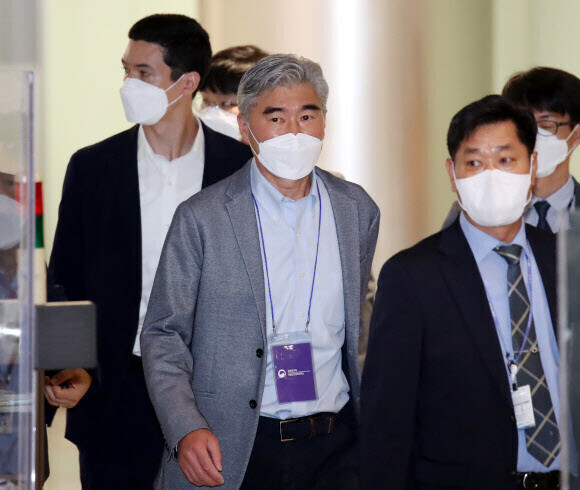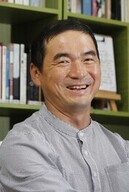hankyoreh
Links to other country sites 다른 나라 사이트 링크
[Column] For ground to harden in US-N. Korea relations

I recently read the contribution published in the Aug. 24 issue of the Hankyoreh by Sung Kim, the US Ambassador to Indonesia who is currently serving as the US special representative for North Korea.
In it, he quoted a Korean idiom that goes, “After the rain, the ground hardens,” stressing that even with the various hurdles in North Korea-US relations, there will be opportunities to seek “calm and possibility.”
I would also like to see that, but I could not shake the sense that the Joe Biden administration’s North Korea policy course described in Kim’s column will not be enough to resolve the current issues. It was difficult to see any sign of reflection on the reasons US policies on North Korea have failed to date.
Kim first stressed that the US “does not have hostile intent toward the DPRK.” But this is something the past four administrations in the US have all said. The expression was even used by the George W. Bush administration, which referred to North Korea as part of the “Axis of Evil.”
The same is true for his characterization of South Korea-US joint military exercises as “routine” and “defensive.”
So why does even the Biden administration view the North Korea policies of the past four administrations as having failed to yield results? More importantly, can it produce different results while saying the exact same things as past administrations? I very much doubt that.
In connection with this, I’d like to share with Kim and other US diplomats the recollections of one of their predecessors, Donald Gregg. While working as US Ambassador to South Korea in the early 1990s, he held close discussions with South Korea that led to a decision to suspend “Team Spirit,” a South Korea-US joint military exercise.
The exercise’s suspension was announced in January 1992 by then-Presidents Roh Tae-woo and George H. W. Bush. Having been notified in advance, North Korea responded by agreeing to the Inter-Korean Basic Agreement, the Joint Declaration of the Denuclearization of the Korean Peninsula, and membership in International Atomic Energy Agency safeguards agreements.
But in October of that same year, the South Korean and US defense ministers announced that Team Spirit was back on. They went ahead with it the following year, and North Korea answered by withdrawing from the Treaty on the Non-Proliferation of Nuclear Weapons.
After seeing this, Gregg lamented that the resumption of the Team Spirit exercise had been “one of the biggest mistakes” in terms of Korean Peninsula policy. His remarks carried a strong sense of ruefulness: if only the South Korea-US alliance had kept its promise.
Nearly 20 years later, another US president pledged to suspend joint military exercises. Donald Trump made that promise first in Singapore in 2018 and then again in Panmunjom in 2019. But that promise was not kept either.
For the ground to harden after a rain, it first needs to stop raining. When we carry on with the joint military exercises, that’s like rain continuing to fall — even more so when a US president made a pledge.
But the Biden administration’s approach has been to let the rain fall, all while claiming that the rain has stopped and it’s time for dialogue.
Sung Kim stressed the need to implement UN Security Council resolutions — sanctions on North Korea, in other words — but added that the administration would “continue to advocate for the human rights of the North Korean people.” I have to ask whether these two things go together.
Intensive economic sanctions contribute nothing to resolving the North Korean nuclear issue, while compounding the suffering for North Korea’s people. If the US is truly interested in denuclearizing the Korean Peninsula and improving the human rights of North Koreans, it needs to start by changing its attitude on sanctions.
In other words, it needs to ease those sanctions as a step toward achieving denuclearization and improved human rights.

By Cheong Wook-Sik, director of the Hankyoreh Peace Institute and director of the Peace Network
Please direct comments or questions to [english@hani.co.kr]

Editorial・opinion
![[Column] Season 2 of special prosecutor probe may be coming to Korea soon [Column] Season 2 of special prosecutor probe may be coming to Korea soon](https://flexible.img.hani.co.kr/flexible/normal/500/300/imgdb/original/2024/0426/3317141030699447.jpg) [Column] Season 2 of special prosecutor probe may be coming to Korea soon
[Column] Season 2 of special prosecutor probe may be coming to Korea soon![[Column] Park Geun-hye déjà vu in Yoon Suk-yeol [Column] Park Geun-hye déjà vu in Yoon Suk-yeol](https://flexible.img.hani.co.kr/flexible/normal/500/300/imgdb/original/2024/0424/651713945113788.jpg) [Column] Park Geun-hye déjà vu in Yoon Suk-yeol
[Column] Park Geun-hye déjà vu in Yoon Suk-yeol- [Editorial] New weight of N. Korea’s nuclear threats makes dialogue all the more urgent
- [Guest essay] The real reason Korea’s new right wants to dub Rhee a founding father
- [Column] ‘Choson’: Is it time we start referring to N. Korea in its own terms?
- [Editorial] Japan’s rewriting of history with Korea has gone too far
- [Column] The president’s questionable capacity for dialogue
- [Column] Are chaebol firms just pizza pies for families to divvy up as they please?
- [Column] Has Korea, too, crossed the Rubicon on China?
- [Correspondent’s column] In Japan’s alliance with US, echoes of its past alliances with UK
Most viewed articles
- 1No good, very bad game for Korea puts it out of Olympics for first time since 1988
- 2[Column] Season 2 of special prosecutor probe may be coming to Korea soon
- 3Korea’s 1.3% growth in Q1 signals ‘textbook’ return to growth, says government
- 4‘We must say no’: Seoul defense chief on Korean, USFK involvement in hypothetical Taiwan crisis
- 5Is N. Korea threatening to test nukes in response to possible new US-led sanctions body?
- 6Division commander ordered troops to enter raging flood waters before Marine died, survivor says
- 7[Column] ‘Choson’: Is it time we start referring to N. Korea in its own terms?
- 8Will NewJeans end up collateral damage in internal feud at K-pop juggernaut Hybe?
- 9Korea sees more deaths than births for 52nd consecutive month in February
- 10[Editorial] Korea’s surprise Q1 growth requires objective assessment, not blind fanfare